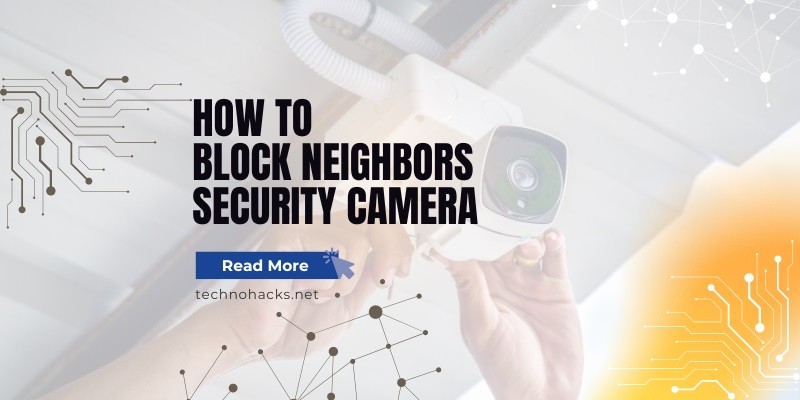Last Updated on May 5, 2025 by Jim C.
Security cameras have become increasingly common in residential areas, but they can sometimes raise privacy concerns when pointed toward neighboring properties. If you’re worried about a neighbor’s security camera infringing on your privacy, there are several legal and ethical approaches you can take to address the issue. This article will explore various methods to block or mitigate the impact of a neighbor’s security camera while staying within legal and ethical boundaries.
Understanding the Legal Landscape
Before taking any action, it’s crucial to understand the legal aspects surrounding security cameras and privacy rights. In the United States, there is no specific federal law governing the use of home security cameras. However, there are national privacy and consent laws that apply to video surveillance. Additionally, many states, counties, and cities have their own regulations regarding security cameras.
Generally, it is legal for property owners to install security cameras on their property, even if those cameras capture some footage of neighboring areas. However, there are limitations:
- Cameras should not be aimed at areas where there is a reasonable expectation of privacy, such as bathrooms, bedrooms, or changing rooms.
- In some jurisdictions, audio recording without consent may be illegal.
- The use of hidden cameras may be subject to different regulations than visible cameras.
It’s important to note that laws can vary significantly between jurisdictions, so it’s advisable to consult local regulations or seek legal advice for specific situations.
Ethical Considerations
While legal rights are important, maintaining good relationships with neighbors is also crucial. Before taking any action to block a security camera, consider the following ethical points:
- Your neighbor may have legitimate security concerns that led to the camera installation.
- Open communication can often resolve issues without resorting to more drastic measures.
- Any action taken should be proportionate to the privacy concern and should not escalate tensions unnecessarily.
Approaches to Blocking or Mitigating Security Cameras
1. Communication with Your Neighbor
The most straightforward and often most effective approach is to have an open conversation with your neighbor. Many privacy issues arise from misunderstandings or lack of awareness. When approaching your neighbor:
- Be polite and non-confrontational.
- Explain your specific privacy concerns.
- Ask to see the camera feeds to understand what is being captured.
- Suggest compromises, such as adjusting camera angles or adding privacy masks to the footage.
2. Natural Barriers
If direct communication doesn’t resolve the issue, consider creating natural barriers to block the camera’s view:
- Plant tall trees or shrubs along property lines.
- Install privacy fences or screens.
- Use bamboo curtains or yard shade sails for targeted blocking.
These methods not only provide privacy but can also enhance the aesthetics of your property.
3. Window Treatments
For cameras pointed toward windows, consider:
- Installing curtains, blinds, or shades.
- Applying reflective window film, allows you to see out during the day while blocking external views.
4. Strategic Lighting
Bright lights can effectively disrupt a camera’s ability to capture clear footage, especially at night:
- Install motion-activated floodlights in areas of concern.
- Use infrared LED lights, which are invisible to the human eye but can overwhelm a camera’s night vision capabilities.
5. Legal Recourse
If other methods fail and you believe your neighbor’s camera placement violates local laws or unreasonably invades your privacy, consider:
- Contacting local authorities or a homeowners association for mediation.
- Consult with a lawyer to understand your legal options.
- In extreme cases, seeking a legal injunction to have the camera removed or repositioned.
6. Install Your Own Security Measures
While not directly blocking your neighbor’s camera, installing your own security system can:
- Provide evidence if your neighbor’s camera is being used inappropriately.
- Deter potential monitoring by creating a mutual deterrent.
- Enhance your overall sense of security.
7. Use of Technology
Some technological solutions can help protect your privacy:
- Anti-surveillance devices that emit infrared light to obscure camera views.
- Radiofrequency (RF) detectors to locate hidden cameras.
However, be cautious with these methods, as some may be illegal or could damage your neighbor’s property.
What to Avoid
When addressing concerns about a neighbor’s security camera, it’s crucial to avoid actions that could be illegal or escalate the situation:
- Do not tamper with, damage, or destroy your neighbor’s camera or property.
- Avoid using laser pointers or bright lights to deliberately blind cameras, as this could be considered harassment or property damage.
- Don’t use signal jammers or other devices to interfere with wireless cameras, as this is illegal in many jurisdictions.
Conclusion
Dealing with a neighbor’s security camera that infringes on your privacy can be challenging, but there are several legal and ethical approaches available. Start with open communication and progress to more involved solutions only if necessary. Always prioritize maintaining good neighborly relations and staying within legal boundaries.

